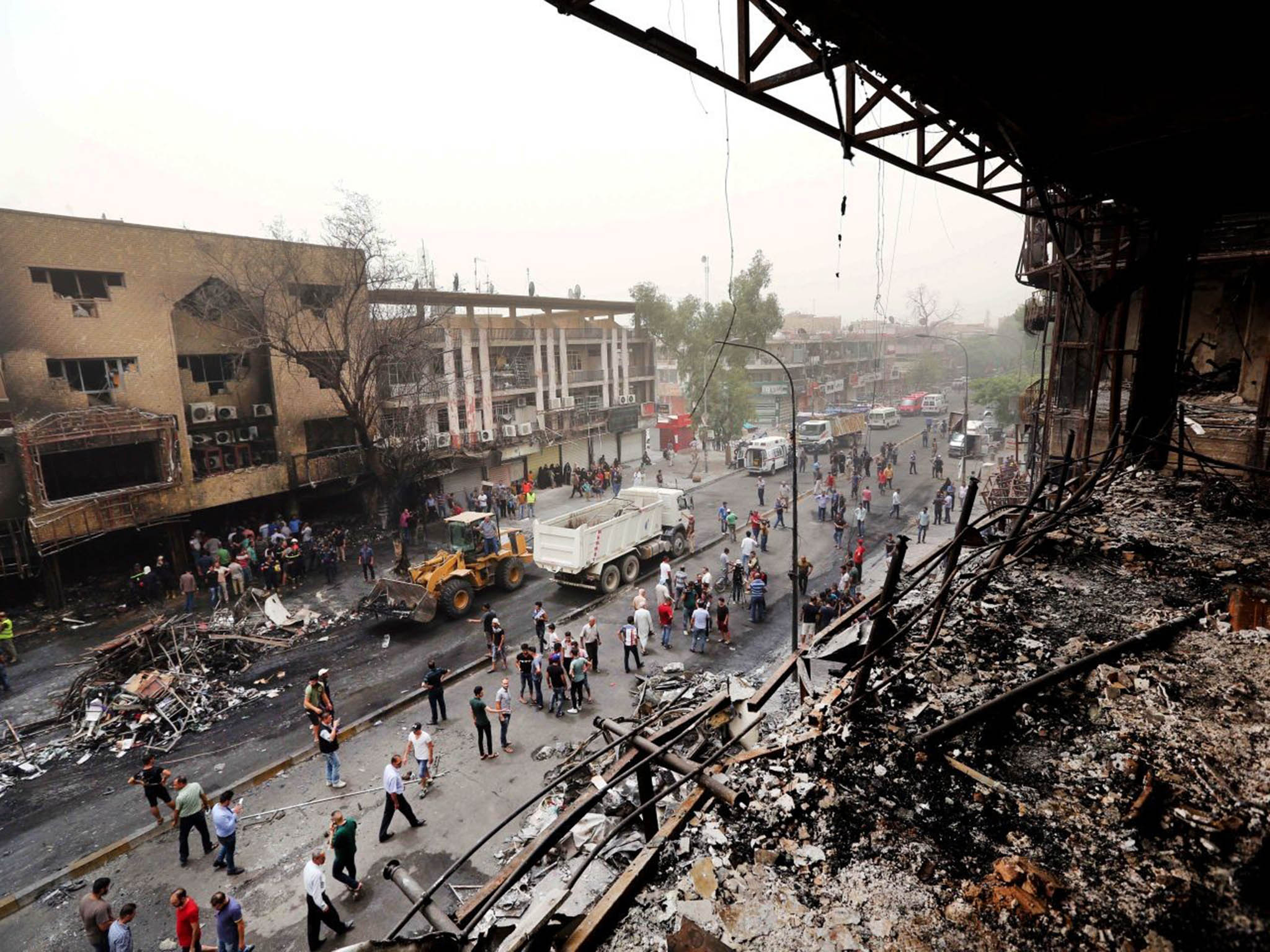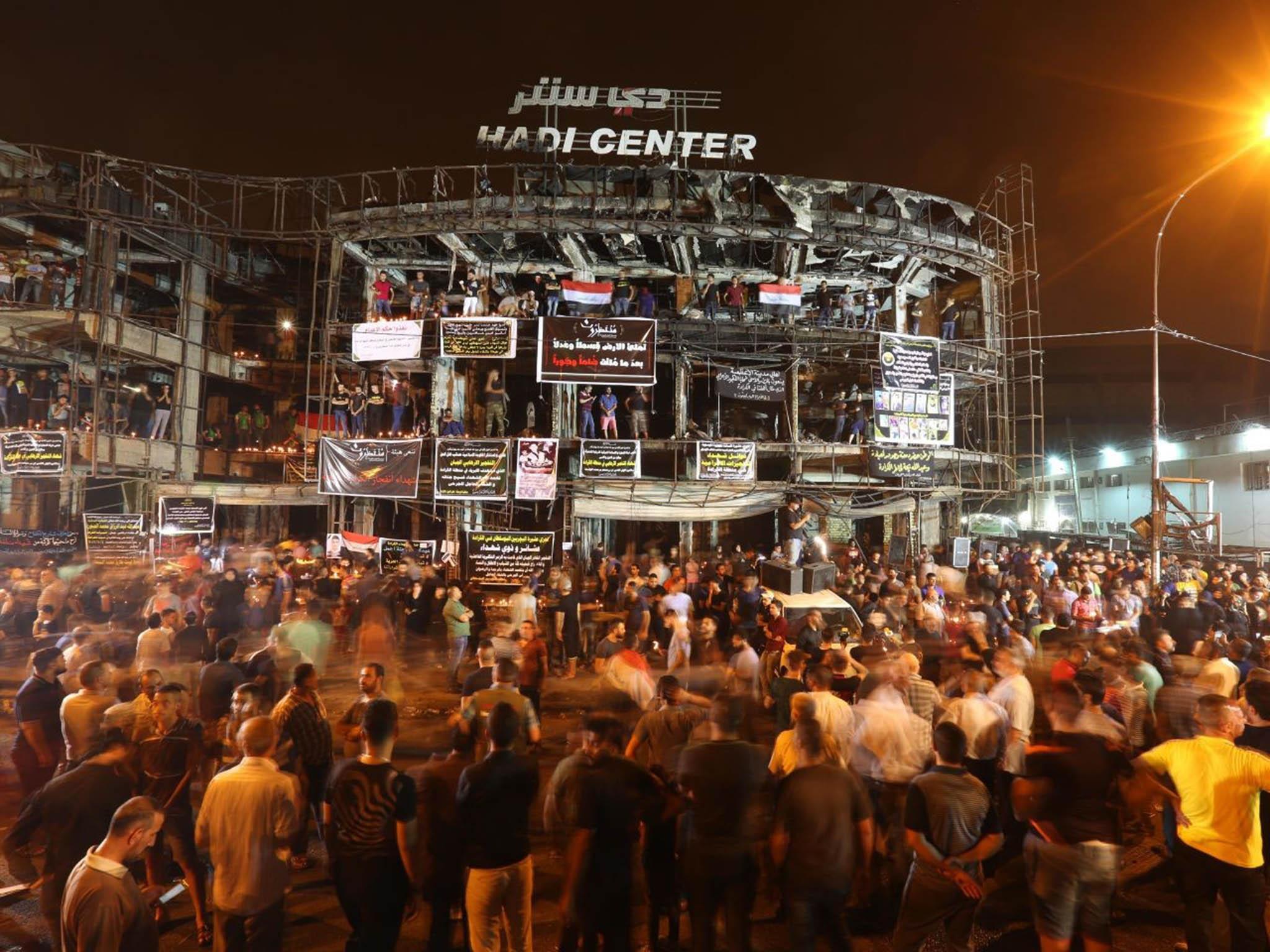Baghdad attack: Death toll from Isis bombing rises to 250 in deadliest explosion to hit Iraq capital since 2003
The Iraqi interior minister has resigned amid rising public anger over a series of attacks

Your support helps us to tell the story
From reproductive rights to climate change to Big Tech, The Independent is on the ground when the story is developing. Whether it's investigating the financials of Elon Musk's pro-Trump PAC or producing our latest documentary, 'The A Word', which shines a light on the American women fighting for reproductive rights, we know how important it is to parse out the facts from the messaging.
At such a critical moment in US history, we need reporters on the ground. Your donation allows us to keep sending journalists to speak to both sides of the story.
The Independent is trusted by Americans across the entire political spectrum. And unlike many other quality news outlets, we choose not to lock Americans out of our reporting and analysis with paywalls. We believe quality journalism should be available to everyone, paid for by those who can afford it.
Your support makes all the difference.The death toll of a car bombing at a shopping centre in Baghdad has reached 250 in the worst single terror attack to hit the Iraqi capital since the 2003 war.
Isis claimed responsibility for Sunday’s atrocity, which struck a district of the city home to mainly Shia Muslims, who are considered “apostates” by the group.
A vehicle packed with explosives was detonated minutes after midnight local time as the area bustled with families shopping at the popular al-Hadi Centre ahead of celebrations marking the end of Ramadan.
The blast engulfed the shopping mall and surrounding cafes and flames that receded to leave the buildings gutted and charred, with many bodies unrecognisable.
It was the deadliest bombing to hit Baghdad in more than a decade of war and insurgency, coming amid a series of almost daily attacks by the so-called Islamic State as it continues to lose territory in Iraq, Syria and Libya.
Mohammed Ghabban, the Iraqi interior minister, announced his resignation on Thursday amid growing public anger over the inability of state security forces to protect civilians.
He previously said the car bomb – concealed in a refrigeration van - came from the eastern province of Diyala and blamed a lack of communication between multiple forces in charge of Baghdad’s security.
There were unconfirmed reports that the vehicle came through checkpoints manned by officers using fake bomb detectors, five years after the “magic wand” devices were exposed as a sham and sparked several prosecutions in the UK.
A police officer in Baghdad confirmed the hand-held ADE 651 detectors were still in use.
Speaking to Reuters last month, Mr Ghabban said the spate of Isis attacks would not end unless “disorder” plaguing Iraq's security apparatus was rectified, adding that some counter-terror agencies, defence ministry directorates and regional commands overlapped.
Like in other recent attacks, Isis’ initial propaganda claim for Sunday’s attack said it targeted a “gathering of the Popular Mobilisation Committees “– predominantly Shia armed groups fighting its militants alongside Iraqi security forces.
But authorities say there were many women and children among the civilian victims, and a later statement from the organisation made it clear religion was the target, saying: “The raids of the mujahedeen [holy warriors] against the Rafidha [Shia] apostates will not stop.”
Like Sunni jihadist groups, Isis considers the Shia Muslim sect heretical and has made its followers the main target of its attacks in Iraq.
Shias comprise the country’s majority, as they do in Iran, Bahrain and other nations, while Sunnis are dominant in Saudi Arabia and more than 40 countries stretching from Morocco to Indonesia.
While al-Qaeda leaders considered attacks on Shia civilians too extreme and detrimental to public support – as well as a distraction from its jihad against the West – Isis has made the massacres a priority, targeting symbolic shrines, holy cities and pilgrimages.
Shias were also the main victims of Isis’ deadliest ever terror attack in Iraq, when militants massacred 670 prisoners in a raid in Badush in June 2014.
In one of the worst war crimes in the current conflict, Isis militants also killed up to 1,700 mostly Shia Iraqi Air Force cadets after overrunning the Camp Speicher base near Tikrit in 2014.

The Global Terrorism Index ranks Iraq as the country in the world most affected by terrorist activity, followed by Afghanistan, Nigeria and Syria.
Almost 10,000 people were killed in attacks there in 2014 - more than the cumulative total of fatalities from terrorism in the entire world from 1998 to 2000 – and the number has continued to rise.
A United Nations report said at least 900 Iraqis were killed and 1,500 wounded in May alone, when Baghdad was the worst-affected district.
Zeid Ra’ad al-Hussein, the UN High Commissioner for Human Rights, urged Iraqi authorities to do more to protect civilians and work to ensure that extremists cannot “tap into resentments” over authorities’ reactions to gain more followers.
“I utterly condemn this latest horrendous Isis atrocity, targeting innocent civilians who were celebrating Ramadan in the heart of Baghdad,” Mr al-Hussein said.
“Along with other recent abominations associated with Isis in Dhaka, Istanbul and Orlando, the sheer unrestrained viciousness of these people defies belief…after the loss of Ramadi and Fallujah, with Mosul likely to be the next big battleground, I fear we will see more of these atrocities by Isil, as they seek to make Iraq implode once more.
“The way we react, in Iraq and elsewhere, will in many ways decide whether Isis benefits from its indiscriminate acts of mass murder, or is ultimately destroyed by them.”
Join our commenting forum
Join thought-provoking conversations, follow other Independent readers and see their replies
Comments